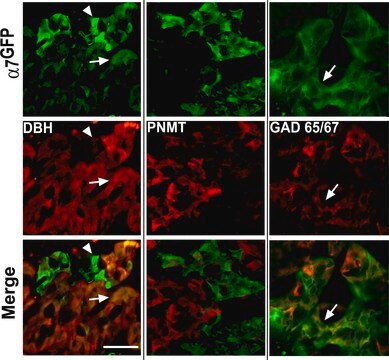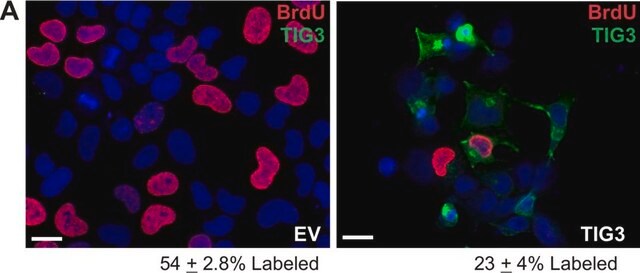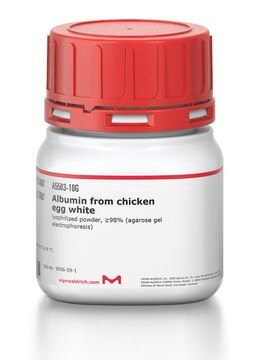Key Documents
B6804
Monoclonal Anti-Bacterial Alkaline Phosphatase (BAP, PhoA) antibody produced in mouse
clone BAP-77, ascites fluid
Synonim(y):
Monoclonal Anti-Phosphatase, Alkaline, bacterial
About This Item
Polecane produkty
pochodzenie biologiczne
mouse
Poziom jakości
białko sprzężone
alkaline phosphatase conjugate
forma przeciwciała
ascites fluid
rodzaj przeciwciała
primary antibodies
klon
BAP-77, monoclonal
masa cząsteczkowa
antigen ~50 kDa
reaktywność gatunkowa
bacteria
metody
indirect ELISA: suitable
western blot: 1:20,000 using purified Escherichia coli BAP
izotyp
IgG1
Warunki transportu
dry ice
temp. przechowywania
−20°C
docelowa modyfikacja potranslacyjna
unmodified
Opis ogólny
Immunogen
Zastosowanie
Działania biochem./fizjol.
Oświadczenie o zrzeczeniu się odpowiedzialności
Nie możesz znaleźć właściwego produktu?
Wypróbuj nasz Narzędzie selektora produktów.
Kod klasy składowania
12 - Non Combustible Liquids
Klasa zagrożenia wodnego (WGK)
WGK 1
Temperatura zapłonu (°F)
Not applicable
Temperatura zapłonu (°C)
Not applicable
Certyfikaty analizy (CoA)
Poszukaj Certyfikaty analizy (CoA), wpisując numer partii/serii produktów. Numery serii i partii można znaleźć na etykiecie produktu po słowach „seria” lub „partia”.
Masz już ten produkt?
Dokumenty związane z niedawno zakupionymi produktami zostały zamieszczone w Bibliotece dokumentów.
Nasz zespół naukowców ma doświadczenie we wszystkich obszarach badań, w tym w naukach przyrodniczych, materiałoznawstwie, syntezie chemicznej, chromatografii, analityce i wielu innych dziedzinach.
Skontaktuj się z zespołem ds. pomocy technicznej






